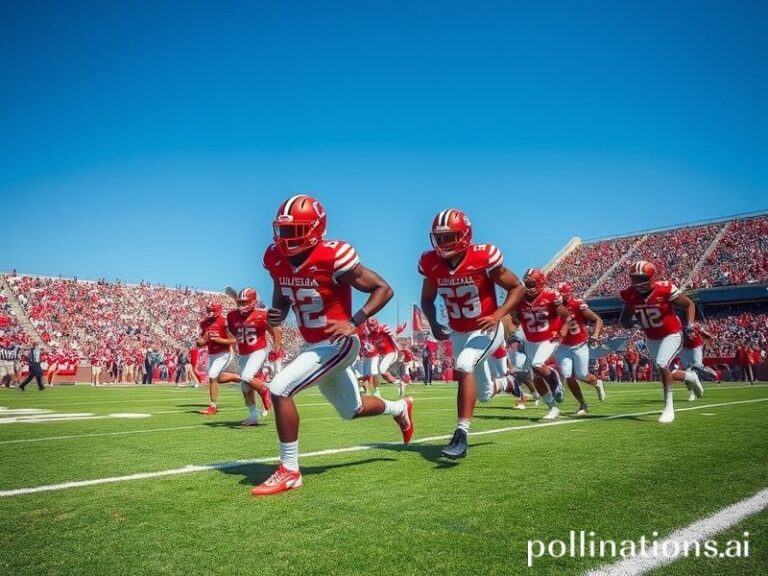Ashley Graham: The Nebraska Supermodel Accidentally Waging Global Psychological Warfare
Ashley Graham: The Planet-Sized Supermodel Who Refuses to Shrink (and Why That Terrifies Every Government from Oslo to Ouagadougou)
When Ashley Graham sashays down a runway in Milan, the seismic ripples are measurable on every Richter scale from Reykjavík to Riyadh. The 36-year-old Nebraska export—equal parts collagen, charisma, and calculated rebellion—has done something no multinational trade accord ever managed: she’s made the world’s body-image neuroses a shared, borderless commodity. And like any good export, she’s taxed—heavily—by the insecurity tariffs of seven billion fragile egos.
In Singapore, ministers reportedly convene emergency sessions whenever Graham posts another un-retouched Instagram story. “If thighs that size can trend,” whispers one anonymous civil servant, “what’s next? Public housing prices that actually fall?” Meanwhile, French legislators—who once legislated the weight of runway models with the same fervor they protect Camembert—now watch, aghast, as department stores from Lille to Lyon stock size 16 bikinis faster than you can say “non, merci.” The Fifth Republic has survived revolutions, but cellulite acceptance may be the final frontier.
Global brands, those ever-opportunistic vultures circling the zeitgeist, have smelled opportunity. From Lagos to Lima, billboards now feature Graham’s hourglass silhouette beside slogans clumsily translated into 47 languages, each promising “confidence” in exchange for a credit-card swipe. The irony, of course, is thicker than contour sticks at a beauty vlogger convention: capitalism selling self-acceptance back to the very people it made insecure in the first place. Somewhere in Davos, a CEO wipes away a single tear—of joy, naturally—while calculating how many more units “empowerment” will move in Q3.
The geopolitical implications ricochet like stray bullets. In South Korea, where K-pop idols are rumored to subsist on air and resentment, Graham’s popularity has triggered a quiet crisis. Government statisticians note a 12% drop in extreme-diet app downloads—a metric that, in Seoul, qualifies as a national security threat. Meanwhile, Brazilian plastic surgeons, once the Michelangelos of silicone, now report clients requesting “Graham curves,” which is medical-speak for “make me look like I eat carbs without actually eating them.” The realest currency in Rio isn’t the real; it’s plausible deniability.
But the true casualty may be the global language of apology women are taught to speak fluently from birth. Graham, whose interviews drip with the kind of unapologetic candor that makes diplomats sweat, has effectively canceled that dialect. When she tells the BBC, “I’m not here to make you comfortable,” subtitles in 22 languages scramble to keep up. In Japan, the phrase has been meme-ified into a pop-punk lyric; in Saudi Arabia, it’s whispered in mall food courts like contraband. Somewhere, a UN interpreter loses sleep over whether “comfortable” carries the same weight as “regime change.”
And yet, for all the triumphalism, the cynic’s eyebrow remains arched. Graham’s empire—spanning swimwear, podcasts, and a forthcoming children’s book titled “Your Body Is Not a Before Photo”—is still, at its core, an empire. Every revolution needs a face, preferably one with high cheekbones and a Q-score. The same algorithms that once throttled body diversity now amplify her, proving that even rebellion can be monetized if you tag the right sponsor. In the end, the world’s waistlines may expand, but the profit margins expand faster.
So, as another Fashion Week looms and the planet braces for whatever body-positive bombshell Graham will drop next, remember this: the most radical thing about her isn’t her size, or her skin, or her refusal to photoshop. It’s that she’s convinced us—momentarily—that self-worth isn’t a zero-sum game. A dangerous notion, really. If enough people believe it, who knows what else they might start thinking they deserve? Peace, perhaps. Or worse—reasonable working hours.
And that, dear reader, is how a supermodel from Lincoln, Nebraska became an international incident. Pass the croissants.







